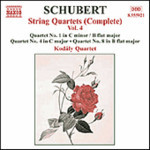
Schubert: Complete String Quartets Vol 4 (Nos 1, 8 & 4)
 $25.00
Out of Stock
$25.00
Out of Stock6+ weeks add to cart
FRANZ SCHUBERT
Schubert: Complete String Quartets Vol 4 (Nos 1, 8 & 4)
Kodaly Quartet
[ Naxos / CD ]
Release Date: Sunday 4 March 2007
This item is currently out of stock. It may take 6 or more weeks to obtain from when you place your order as this is a specialist product.
"The Kodály Quartet is particularly good in D112, shaping the lyrical themes of the first movement with gentle flexibility creating a beautiful dusky sonority for the G minor Andante and giving the lusty minuet a real Schuhplattler earthiness. Crucially, too, the players relish the delicacy and wit of the finale. The Kodály's warmth and uncomplicated honesty of approach also work well in the earlier quartets."
- BBC Music Magazine, January 2003
Franz Schubert was born in 1797, the son of a Vienna schoolmaster, and had his education as a chorister of the Imperial Chapel at the Staatskonvikt. Both at school and at home he had an active musical life as a player and as a composer, and when his voice broke and he was offered the means to continue his academic education, he decided, instead, to train as a teacher, thus being able to devote more time to music. By the age of eighteen he had joined his father in the schoolroom, while continuing to compose and to study with the old Court Kapellmeister Antonio Salieri. In 1816 he moved away from home, lodging with his new friend, Franz von Schober, thus released for the moment from the drudgery of teaching. The following years found him generally in the company of friends, with an occasional return to the schoolroom, when necessity dictated, showing there no great talent or interest in his task.
Schubert's brief career continued in Vienna and while there were occasional commissions and some of his works were published, there was never the opportunity for the kind of distinguished patronage that Beethoven had had and still enjoyed, nor the possibility of an official position in the musical establishment of the city. It was February 1828 before Schubert was able to take the risk of a concert devoted to his work, an event that proved both successful and profitable, but by the autumn his health had weakened, the consequence of a venereal infection contracted six years earlier. He died on 19 November.
As a composer Schubert was both precocious and prolific. Over the years he wrote some five hundred songs and a quantity of piano and chamber music, including fifteen string quartets, with larger scale works for the theatre and for orchestra, although he never had a professional orchestra regularly available to him, as Haydn had had by the nature of his employment as a princely Kapellmeister, or as Beethoven had through the good offices of his rich patrons. He was able to hear his orchestral compositions in performances by an ensemble that had developed over the years from the Schubert family string quartet, while chamber music on occasions received professional attention, notably from Schuppanzigh and his colleagues. Schubert himself was both pianist and string-player and as a boy had played the viola in the family quartet, where his father played the cello and his older brothers the violin. The language of the classical string quartet had long been familiar to him.
Tracks:
String Quartet No. 8 in B flat major, Op. 168, D. 112
String Quartet No. 1 in C minor, D. 18
String Quartet No. 4 in C major, D. 46



